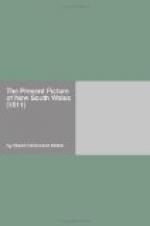of these disaffected persons had hitherto been conducted
with such secrecy, that no suspicion of their views
was entertained, until the 4th of March in this year,
when a violent insurrection broke out at Castle Hill,
a settlement between Parramatta and Hawkesbury, and
the insurgents expressed their determination to emancipate
themselves from their confinement, or to perish in
the struggle for liberty. Information of the extent
and alarming appearance of this mutiny having reached
the governor, it was deemed necessary, on the following
day, to proclaim martial law; and a party of the troops,
under the command of Lieutenant-Colonel George Johnston,
were directed to pursue the rebels. After a long
march, the military detachment came up with the insurgents,
near the Ponds, about half-way between Parramatta
and Hawkesbury, and a short parley ensued, when the
Colonel found it necessary to fire upon them; and,
after killing several of the misguided rebels, and
making prisoners of the principals who survived, the
remainder made a rapid retreat. Ten of the leaders
of this insurrection, who had been observed as particularly
conspicuous and zealous in their endeavours to seduce
the rest, were tried on the 8th of March, and capitally
convicted. Three were executed on the same evening
at Parramatta, since it was justly concluded, that
measures of prompt severity would have a greater effect
upon the minds of those who had forsaken their allegiance.
On the following day, two other rebels were executed
at Sydney, and three at Castle Hill: the two
remaining criminals were respited, as they were the
least corrupted, and had discovered symptoms of sincere
remorse for the part which they had taken in the late
operations. On the 9th, martial law was repealed;
and from that moment no disturbance has again broken
in upon the peace of the settlement of a serious nature,
although it would be too much to suppose that the seeds
of insubordination and disorder were entirely eradicated
by the frustrated event of the first endeavour.
Men of such desperate characters as are to be found
in this colony, are not to be intimidated by punishment,
nor discouraged by failure from the pursuit of that
career of depravity, which is become dear to them
from habit; nothing short of death can destroy, in
those minds, the affection for vice, and the determination
to gratify their ruling passion, in spite of obstacles,
however alarming, or opposition, however strenuous
and vigilant. Mr. Dixon, a Roman Catholic priest,
who had been sent under an order of transportation
from Ireland, for his principles, accompanted Colonel
Johnston on this service, and proved to be of some
utility in bringing back the insurgents to a proper
sense of their duty. It cannot be too much to
say, that the conduct of Mr. Dixon, before and after
this business, was strictly exemplary.




